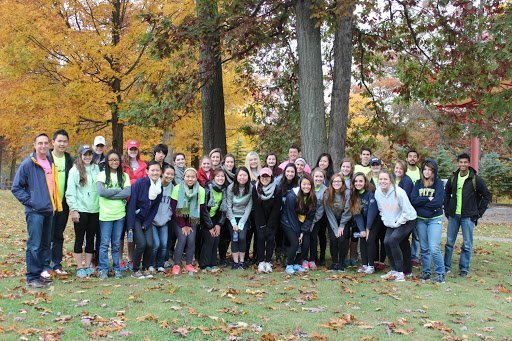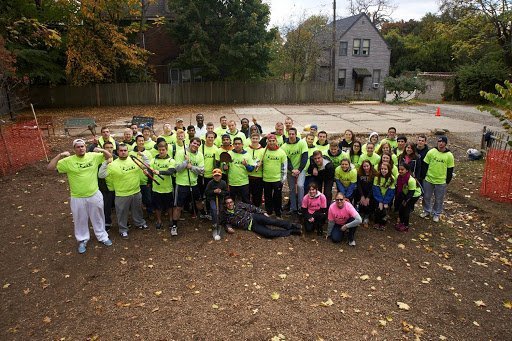Every January, Martin Luther King, Jr. Day marks one of the major volunteer service events for colleges, universities, high schools, and even elementary schools across the country. This event brings hundreds of thousands of people together to serve on MLK Day. It has become a great way for students to work together in large numbers to better their surrounding communities. However, having an entire university population serve simultaneously is certainly not an easy accomplishment!
If you’re planning a campus-wide service event for the first time, have one coming up this semester, or would like to initiate one in the future, here are 10 tips from seasoned veterans to ensure a successful and meaningful event.
1. PLAN EARLY AND CHECK THE CALENDAR
“These events require extensive planning, research, and communication,” said Misti McKeehen, director of PittServes, a university-wide initiative to help build the culture of service within the University of Pittsburgh and their surrounding community.

In addition to their MLK Day of Service and orientation service projects, PittServes organizes the university’s annual Pitt Make A Difference Day (PMADD) every October. Each year, thousands of students volunteer with more than a hundred organizations logging as many as 13,000 service hours in one day.
“The key is to plan early and identify a date that doesn’t conflict with other university events,” said McKeehen. “You don’t want to compete with other school activities like home football games.”
2. CHOOSE COMMUNITY ORGANIZATIONS THAT ALLOW YOU TO BUILD A LONG-TERM PARTNERSHIP
When choosing organizations for your large-scale service event, consider ways the partnership can become a long-term opportunity for your students, not just a volunteer option for the day. McKeehen said it’s important to work with your community partners and encourage them to discuss ideas about why your volunteer service is vitally important.
Adam Lewandowski, associate director for the Center for Civic Engagement at Nazareth College in Rochester, New York, said they also look at each partner’s ability to give an overview of their organization and what they want to do. “It’s critical to work with the community to help them have a voice,” said Lewandowski. “We view them as co-educators that help create the frame of reference. We understand each other and have shared goals to achieve through the day of service.”
Lewandowski said that 93% of the students who participated in their Orientation Day of Service are expected to volunteer again with one of their partner organizations, many of which offer work-study or service-learning programs.
3. ENSURE SERVICE PROJECTS ARE MEANINGFUL AND SAFE
It’s imperative that all community partners are fully aware of and agree to specific arrangements and commitments regarding providing meaningful activities in a safe environment. Partners should be able to share with the students why their service work is vital to their organization.
“There needs to be a connection of the proposed project with the mission of the organization,” said Lewandowski. “We ask our partners to craft a project and then we work closely with them to make sure to provide service activities that are helpful.”
For example, one of their partners provides horseback rides to developmentally disabled children. Their project involved clearing trails so that companions could walk along side the children riding the horses. “Students had a better understanding of the service opportunity and its impact once it was explained. They weren’t just there to clear weeds and bushes, but to help the children feel more secure while riding the horses.”
4. GET YOUR STUDENTS INVOLVED AS EARLY AS POSSIBLE
“It’s important to know how to recruit volunteers, identify good projects, and how to retain volunteers,” said McKeehen. “Event organizers need to know how to talk about community service to students and partners.”
“Our upperclassmen students serve as orientation leaders,” said Lewandowski. “They receive specific training to facilitate projects, as well as the guided reflection at the end of events. The student leaders coordinate the work at each site. It’s fantastic to have peer leadership. New students can relate to them and they can reflect on their impact and how to move forward from their experience.”
5. COMMUNICATION IS KEY
“Team leaders should call on partners throughout the planning process and the days leading up to the event to make sure everything is in order and that the organizations are ready for the volunteers,” said McKeehen. You don’t want to show up with a bus filled with volunteers and no one at the organization is ready for them – or worse, not even there!
In addition, don’t forget to send out updates and reminders to your volunteers. Take advantage of social media sites to reach and recruit students. Send text alerts regarding start times or any last minute details.
6. HAVE A FACE-TO-FACE AND VISIT THE SITE PRIOR TO THE EVENT TO DETERMINE ANY SPECIAL NEEDS OR REQUIREMENTS.
“It’s of great value to travel into the community and meet with the organizers,” said Lewandowski. “Look at their space and the tools available.”
For example, if students are going to work outside around plants, trees, gardens, etc., make sure they have the proper tools and know to wear appropriate attire to avoid any potential mishaps like coming in contact with poison ivy!

7. DON’T FORGET TRANSPORTATION
If your budget allows, consider renting school buses or use partner sites within walking distance of your school. Lewandowski recommends doing the research to find a reliable transportation company. “Moving 550 people to 25 sites can get crazy,” he said.
8. HAVE CLEAR GUIDELINES, BUT REMEMBER TO BE FLEXIBLE
Large-scale events make it somewhat difficult for individual students to actually choose their volunteer sites, but you could consider letting them request particular types of service. “When we have groups of students from sororities, clubs, etc., sign up, they are usually allowed to volunteer together at specific locations,” said McKeehen.
9. ALWAYS HAVE A BACK-UP PLAN
“Something always comes up,” said McKeehen. What happens if the buses don’t show up? What do you do if your students arrive at a site and no one is there? What’s the plan if it’s raining and your site is outside? Have a contingency plan and make sure your team knows what to do.
10. REMEMBER TO SAY, “THANK YOU” TO YOUR PARTNERS AND YOUR VOLUNTEERS!
In addition, ask them for their feedback so you can make improvements for the next event!
Photos courtesy of University of Pittsburgh and Nazareth College
Have you organized a school-wide service event? Tell us about your day of service activities and share your top planning tips with us! Need help managing your service program? NobleHour can help you build, manage, & measure community engagement!
Since 2007, NobleHour has proven to be the volunteer management solution for organizations across the nation. With its robust online platform, NobleHour enhances community engagement with a variety of innovative and transformative tools for finding, tracking, and measuring volunteer, service‐learning, and community service initiatives. With offices in Lakeland, FL, and Portland, OR, the NobleHour team is dedicated to empowering good in communities across the country.
By NobleHour Special Contributor:

Dolly Duplantier
Consultant, NobleHour
Contributing Writer / Blogger
Public Relations and Communications
Greater Chicago Area
Dolly Duplantier is a freelance writer, editor, and social media specialist. She is the mother of three children, one college graduate, one in college, and one in high school. Writing about people and organizations making a difference is one of the best aspects of her job!

